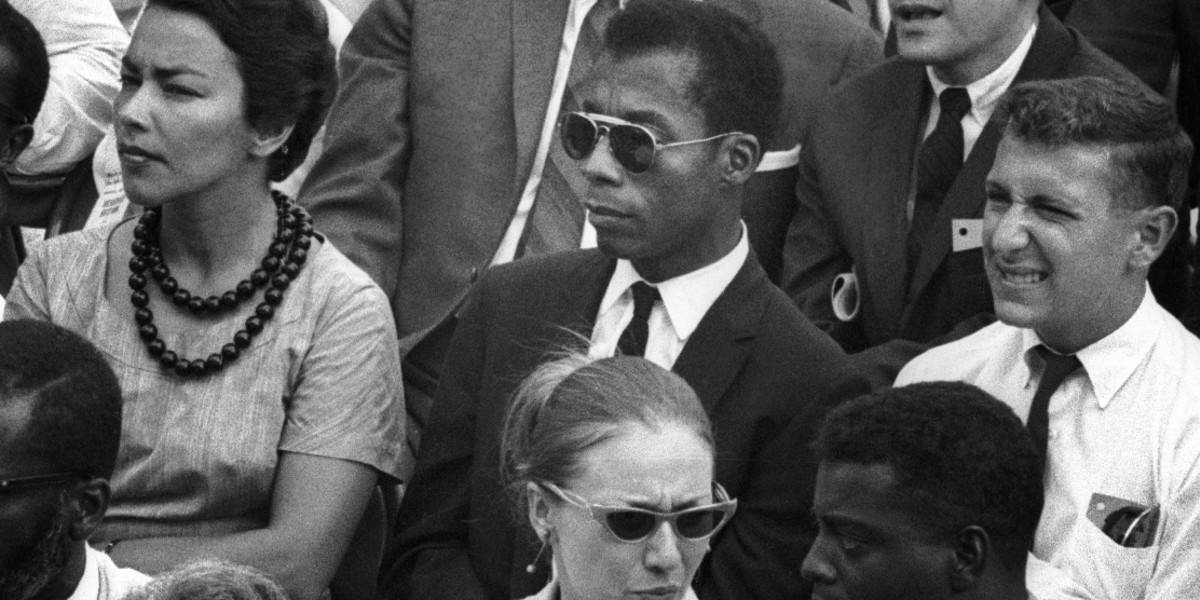 In his spellbinding and heartbreaking Academy Award nominated film, “I Am Not Your Negro,” Haitian filmmaker Raoul Peck examines the story that James Baldwin never finished writing. “Remember This House” was to be a sweeping narrative exploring the lives, journeys, and deaths of three pivotal men in our history; Medgar Evers, Malcolm X, and Martin Luther King Jr. An intricate and fascinating narrative, “I Am Not Your Negro,” gives us a view of both Baldwin and Peck’s journeys as Black men in America, encountering racism and violence.
In his spellbinding and heartbreaking Academy Award nominated film, “I Am Not Your Negro,” Haitian filmmaker Raoul Peck examines the story that James Baldwin never finished writing. “Remember This House” was to be a sweeping narrative exploring the lives, journeys, and deaths of three pivotal men in our history; Medgar Evers, Malcolm X, and Martin Luther King Jr. An intricate and fascinating narrative, “I Am Not Your Negro,” gives us a view of both Baldwin and Peck’s journeys as Black men in America, encountering racism and violence.
Recently, Mr. Peck and I sat down to chat about the highly acclaimed film, the thirty pages from Baldwin’s unfinished text that sparked the idea and Peck’s own confrontation with America and Hollywood in our current political climate which as Baldwin stated, is one full of “apathy and ignorance.”
Raoul Peck: Hi Aramide
Aramide Tinubu: Hello, Mr. Peck how are you?
RP: I’m fine, thank you.
AT: Wonderful. I wanted to say first and foremost that I thought, “I Am Not Your Negro” was stunning. I saw it at the New York Film Festival last fall, and I watched it again last night. It is so riveting, especially considering the political climate that we find ourselves in.
RP: Thank you.
AT: I wanted to ask you first about how you got a hold of the notes from James Baldwin’s “Remember This House.” How were you able to get his estate to agree to hand them over, and what prompted you to do this film after receiving them?
RP: First of all, I decided a little more than ten years ago to tackle Baldwin; to go back to Baldwin. I’ve lived with Baldwin all of my life. I read him very early on as a young man, and he never left me. Baldwin is not somebody who if you read a book or two you cast him aside. He’s not that kind of writer. He’s a philosopher; he’s a poet, he’s a visionary. He has almost a scientific approach to this country, to the world and to human beings. So, he’s almost like a private philosopher that you can come back to and help understand whatever issue that you have or political question that you have. It’s all in Baldwin already. So you can read different books at different stages and come back to that thinking. So it’s very coherent. When I decided to go back, it was more or less to share that thinking with other people because I felt the time was right, and I felt that we really needed a voice like this. Because there were some victories with the Civil Right’s Movement; we have Martin Luther King Day, we have Black History Month, most people think everything is good now, we’ve solved all of the problems. We have monuments; we have museums. But, that’s not the case.
AT: Not at all.
RP: It was necessary politically to bring that back to the forefront and to bring these words in the forefront. When I went to inquire about the rights, everybody told me, “The estate will never even answer your letter, they are known to be very reluctant.” But, I just wrote a letter, and they responded within three days.
AT: Wow!
Continue reading at Shadow and Act.
Image: Raoul Peck


 We exist in a world of cycles. Perhaps nowhere else in society are these cycles as prevalent as they are in the entertainment industry. When I grew up in the ‘90s, there were a plethora of black faces on the big and small screens. From Will Smith’s “Fresh Prince” to “Living Single” (aka the original “Sex and the City”), I could turn to any network television station to see myself, or the people closest to me, represented in some way on screen.
We exist in a world of cycles. Perhaps nowhere else in society are these cycles as prevalent as they are in the entertainment industry. When I grew up in the ‘90s, there were a plethora of black faces on the big and small screens. From Will Smith’s “Fresh Prince” to “Living Single” (aka the original “Sex and the City”), I could turn to any network television station to see myself, or the people closest to me, represented in some way on screen.